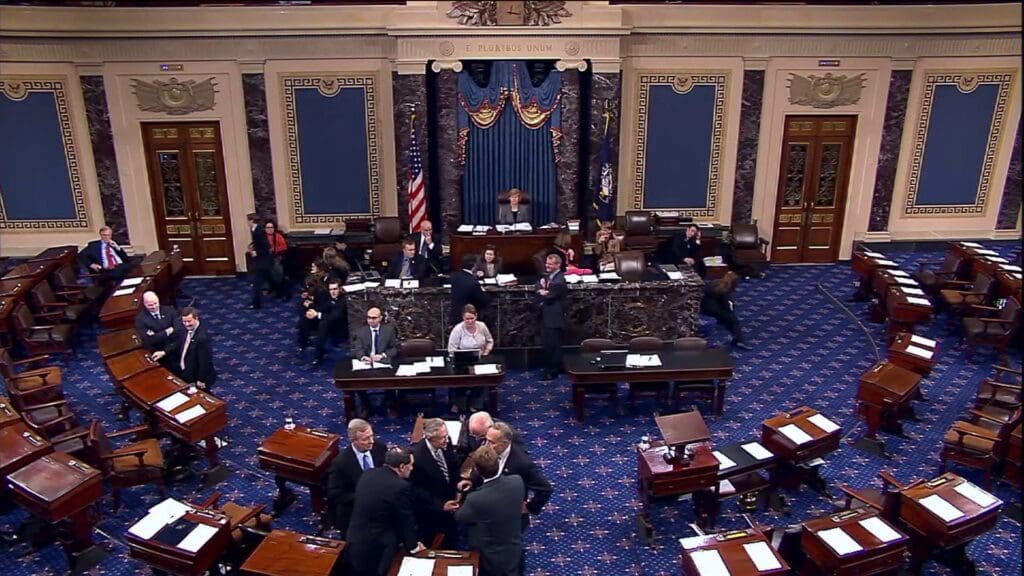
A Senate Delegate for D. C. — It’s a 150 year old idea
At his hearing on District of Columbia Statehood legislation before the Senate Committee on Homeland Security and Governmental Affairs, Chairman Thomas R. Carper (D-DE), called for new ideas and proposals for advancing self determination and representation in Congress for the residents of the District of Columbia until Congress grants full voting representation through statehood or constitutional amendment. Chairman Carper should seriously consider a 150 year old proposal to open the doors of the Senate to an elected delegate representing the residents of the District of Columbia.
In 1970, the U. S. House of Representatives, by an overwhelmingly bipartisan vote (338 to 23), sent to the Senate a bill to enable D. C. residents to elect two non-voting delegates to Congress: one to the House for a two-year term and one to the Senate for a six-year term. Then chairman of the Senate D. C. Committee, Joe Tydings (D-MD), refused to move the measure. The Senate insisted upon its own bill, providing for a House Delegate only.
At the time, a representative of the Washington Board of Trade, testifying in favor of the House bill, challenged anticipated Senate opposition by observing, “Valid ideas do not necessarily have precedents, and someone representing us in the U. S. Senate will have the privilege of the floor and the opportunity to participate in discussions affecting the District of Columbia.”
In 1973, the House again sent to the Senate a measure providing for the election of a D. C. Delegate to the Senate for a six-year term. The delegate proposal was in a section of the DC Home Rule bill that had already passed the House. At the opening of the House-Senate conference on the Home Rule Act, Senator Tom Eagleton (D-MO), Chairman of the Senate D. C. Committee, declared that the provision for a Senate delegate was not even on the table for discussion.
Shortly after the conclusion of the conference, I asked Senator Eagleton if he would consider holding hearings on the concept of a D. C. Senate delegate. His answer was an emphatic “No!” However, Senator Charles Mathias (R-MD), ranking Republican on the D. C. Committee at the time, told me he thought the Senate delegate idea was worthy of consideration by the Senate.
Interestingly, the Senate in 1989 did seriously take up the matter of Senate delegate representation. In the National Resources Committee, a proposal to enable Puerto Rico to send a nonvoting representative to the Senate was defeated in Committee by just one vote (10 to 9), with Republicans and Democrats on both sides of the proposal. In debate, Senator McClure (R-ID) argued in favor, while Senate Malcolm Wallop (R-WY) observed that enacting such a measure would be setting a precedent that D. C. will want and cannot be refused.
In 1997, the Federal City Council sponsored a study on D. C. governance, which concluded that “There can be no denying to one-half million American citizens any representation in the upper house of the national legislature, and therefore recommended that the Senate immediately permit the District to elect a delegate who would have floor privileges and would participate and vote in Senate committee activities.”
Since its founding in 1854, the Republican Party has been advocating various solutions to the Senate representation riddle. When the District of Columbia was given a unified government by Congress in 1871, a delegate to the House was authorized. The local D. C. Republican Committee had petitioned Congress for delegate representation in both the House and the Senate, until the Constitution could be amended to provide for voting representation.
From 1890 to 1930 bills to give D. C. elected delegates to the House and Senate appeared in both Chambers. In 1892, Senator William A. Peffer (R-KS) introduced a bill for D. C. delegates to the House and Senate, each to serve two-year terms. A similar bill was introduced in the House on the 76th birthday anniversary of Frederick Douglass on February 14, 1893. Although in the twilight of his life (Douglass died in 1895), he was delighted by this gesture. Douglass never gave up his ambition to represent the District of Columbia in Congress. In 1871, he had been narrowly defeated in the Republican primary for the nomination to be the first delegate to represent his adopted hometown in Congress. His primary opponent, Norton P. Chipman, was a well-known Union Army veteran who went on to serve two terms in the U. S. House before Congress abolished the office 1875.
If the Senate Democratic leadership is sincere in its desire to provide D. C. residents with access to the Senate floor, then a bill for a Senate delegate could and should be introduced and expeditiously moved to a vote.